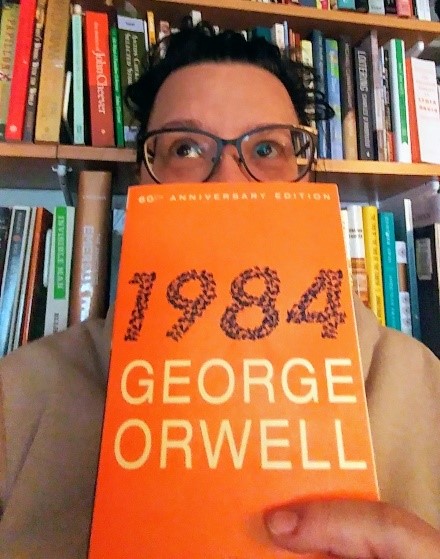This English teacher’s heart beat more quickly this past week, reading quotes from so many people who seem to have read George Orwell’s work. Of course, it also was laden with the hope that people had actually read Orwell’s 1984. As time went on, I realized that it’s easier to invoke an idea of intelligence than it is to actually dwell in the realm of intelligence. And so, here we are, discussing what it means that the world seems to have gone Orwellian.
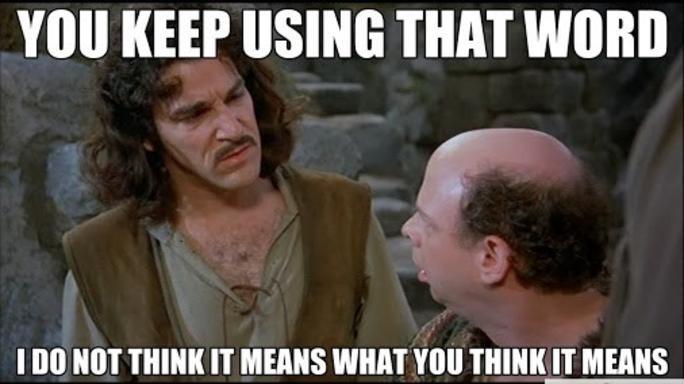
I am not a scholar of Orwell, only a reader. The idea that I’ve always taken from 1984 is not the slogan ideologies that have been usurped through time such as “freedom is slavery,” or “war is peace.” Nor is it that Winston Smith (the protagonist) was captured and punished for his thought crimes. (By the way, excuse my undisclosed spoiler alert here for those who have not read Orwell beyond internet memes.) The scariest aspect of the novel to me is how pervasive thoughts become over time. Ideas, whether correct or not, grab hold of us and, when repeated often enough, seem to permeate our being and twist away from their true meanings to some other Frankenstein-like creation. Like the meaning of the word “Orwellian.”
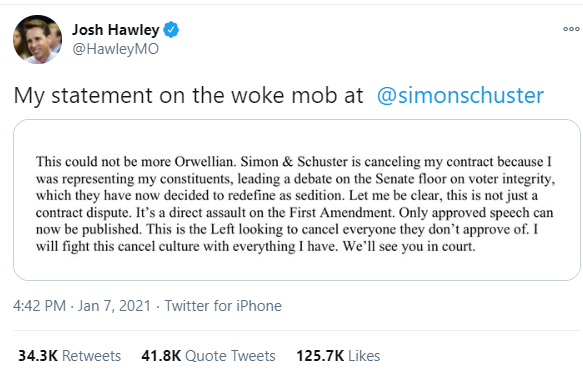
For example, it is not Orwellian to have a book deal canceled. Josh Hawley tries to make the case that the cancelation is due to an extreme reaction from his (now former) publisher or because there is some great conspiracy to keep his words from going to print. In reality, it was for his role in fanning the flames of insurrection on Jan. 6, 2021. People like Hawley move around in this technological world believing they won’t be captured on video or by photograph expressing symbols of solidarity with the insurrectionists:
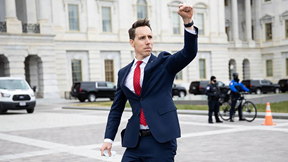
What seems Orwellian to me is not that his book deal was canceled, as he’d have us believe. It is that people like him are blinded by the idea that because they hold a position of some power (through elections) that they are immune to critique and consequences. If Hawley’s goal is publishing, I’ve been told that Amazon has a great self-publishing platform. But if the goal is money, well, then, Hawley may be out of luck—although I’m sure some other publisher will rush to save the day and help him. If, however, his true aim was to express solidarity with insurgents and whip up a mob, then I’m afraid to say that he succeeded not through his writings, but through a gesture. What recourse do the rest of us have against those like Hawley? Very little in our country today. His book deal was canceled, his social media will be monitored, and we can give money to an opposing candidate. The likelihood that he will take responsibility for his actions, that he will step down of his own volition or that he will be forced to resign is…nil.
We find ourselves comparing this time to Orwell’s 1984 (see also: Margaret Atwood and Ray Bradbury) because the novel asks us to imagine what would happen if the world was taken over by fascist ideology. We now have some sense of what true fascism looks like in our own country. Orwell also asks us to imagine that there is no access to education. In 1984, it’s illegal for Smith to own a pen and notebook and to document his own thoughts and ideas. Atwood’s handmaids are given icon cards for shopping; books are burned in Bradbury’s Fahrenheit 451. After four years of trying to teach within the framework of havoc Betsy DeVos has wreaked on our educational system, I don’t think any of these ideas from novels are so fantastical anymore.
Many thought that, by slapping a “democracy” sticker on our definition of the government style of the United States, that would be a sufficient form of fascist-prevention and eliminate the need for any kind of civics or history classes. Instead, what we have seen is that underneath the sticker, the hatred of others and the many forms of oppression they embody never went away and, without ongoing education efforts, ignorance has grown. People invested in oppression have been wallowing in poisonous thoughts and Orwell’s idea of groupthink for more years than we care to acknowledge, and now the sticker has been peeled off. Here is our ugly national truth, laid bare for all to see: deep down, these people are fearful and ignorant. Liberal arts? Novels and television shows like The Expanse are viewed as escapism rather than as potential early warnings by people who understand how to synthesize information from the world around them. One can’t cry “Orwellian” when feelings are hurt, but only when one understands that, for some of us, our country has changed, slowly, insidiously, giving away individual freedoms and then gaslighting us for believing we ever had any freedoms, least of all guaranteed by our constitution and upheld by our elected representatives. For others, these freedoms were never guaranteed. One has only to look at the ongoing, systemic oppression of people of color to understand who our current elected officials at the national level have a vested interest in supporting.
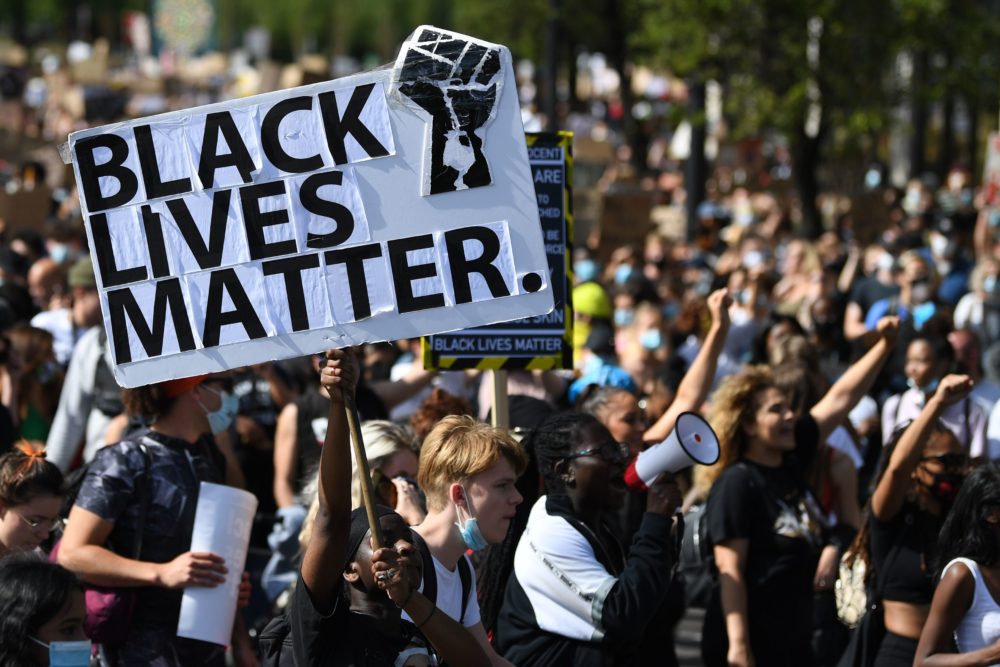
The question many of us have been sitting with this past week is wondering where we go from here. Long term solutions, such as providing equal and free access to healthcare and education, are deemed “too expensive” by half of our voting population. We also can’t retroactively reinstitute civics lessons for younger students or history lessons for all adults. For now, it seems only short-term solutions are keeping some of us going. We’ve broken ties with friends and family members who have different political beliefs. We’ve taken to donating even more funds to political causes. We’re educating ourselves on the history of oppression. We’ve cheered on major social media outlets that are now (belatedly) concerned about hate-speech and in the process of banning bad actors. Yet, some cry that this behavior is Orwellian and Big-Brother-like. Companies shouldn’t be allowed to make these unilateral decisions! Where is our right to free speech?
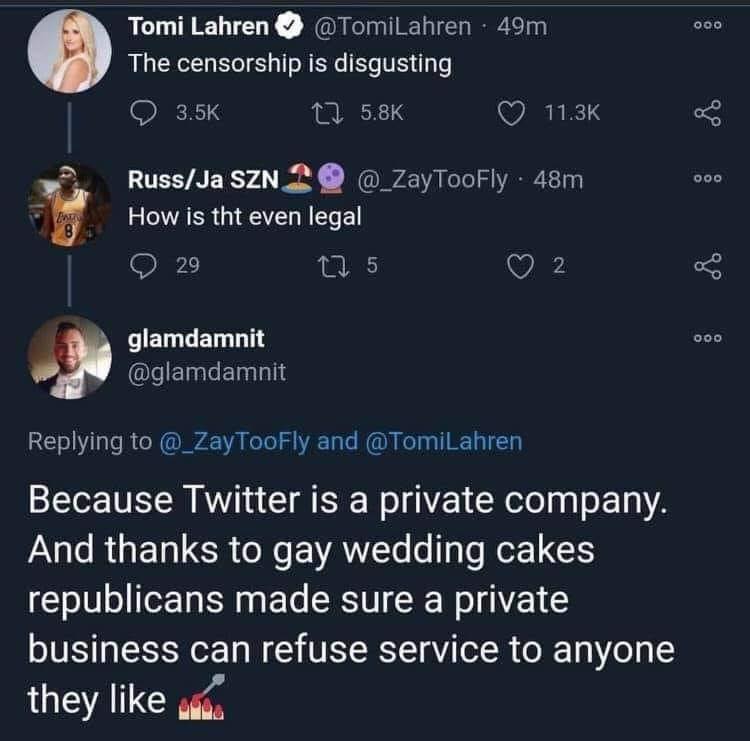
I’m also not a constitutional scholar, but I do keep up with current events. It wasn’t that long ago, 2010 to be exact, that the Supreme Court gave unprecedented freedoms to private companies and political action groups. It also wasn’t that long ago that we learned we can’t have our cake and eat it too. Because in the real world of cakes and Supreme Court rulings, the bad actors now have only themselves to blame for codifying what is Twitter’s decision to ban the almost-former president (and anyone else fomenting hatred and violence) from its platform. This is what happens when a political party chooses to focus on greed, and hatred, and on single-issue politics, and not on all people or the long-term historical ramifications of their decisions and their actions. When elected officials and the courts deem companies have more rights than individuals and that they can choose whom they do business with, they must now live in the same world that they have legislated themselves into. You know, kind of like how Orwell imagined the world might be, someday, when the fascists took over.
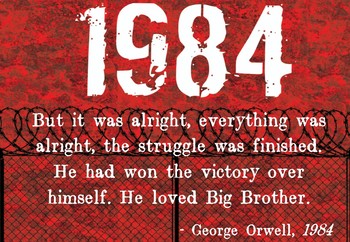
I don’t know where to go from here. It seems each solution I read or hear will take longer to institute than the next and will have no impact on those whose ideologies are repugnant. Deep down, I know that we’ll continue to muster strength from each other even while we continue to experience the lasting effects of trauma and exhaustion. I find myself compelled to move forward by a sense of fear—that I will, indeed, find myself, like Winston Smith, drinking too much gin and crying his same tears, brain-dead from fighting ignorant people. But I push myself to keep reading, writing, thinking, discussing. Because falling into a groupthink mentality where my voice and vote don’t matter as Trump and his followers will have me believe? Now that would be Orwellian.
